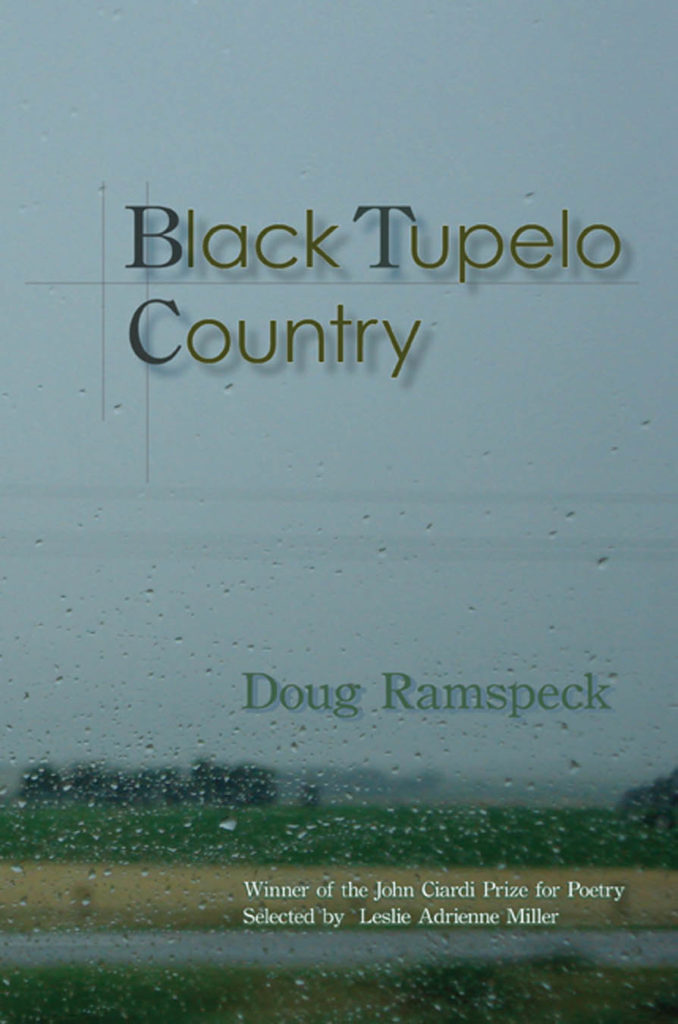Black Tupelo Country
 Title: Black Tupelo Country
Title: Black Tupelo CountryPublished by: BkMk Press (University of Missouri-Kansas City)
Release Date: 2008
Genre: Poetry
ISBN13: 978-1-886157-65-1
Buy the Book: BkMk Press, Amazon, Barnes & Noble, IndieBound
Overview
The poems in Black Tupelo Country explore how superstitions appeal to our primitive selves, how we read into nature our fears and longings, and how the natural and supernatural worlds interconnect in language and perception. Dark satiric poems also occur in the book, including ones about Adam and Eve selling sub sandwiches at a strip mall, Socrates as a homeless man on the streets of Cleveland, and Dr. Mengele working as a Walmart Greeter. Winner of the John Ciardi Prize for Poetry.
Praise
“Black Tupelo Country is a book of cinematic lushness razored with ache. These poems dwell in the dark, mutable seam between the natural and interior worlds . . . It is not a book one can sample, but must be taken in all at once, a Faulknerian saga of sensation and feeling rather than event. Once we are in its world, we want to stay, hold our breath, ride the surprise and suspense, the luxuriant images, waiting, as great novels make one do, for revelation or destruction . . . Like Rilke’s Sonnets to Orpheus, these poems probe that seam between realms/worlds/realities and allow us to glimpse what it might be like to dwell briefly in that between, though because we are human, mortal, of this earth, we cannot comprehend or hold that place for long in our imaginations. But reading Ramspeck’s book lets us glimpse it, one moment, one poem, at a time.”
—Leslie Adrienne Miller
“Deeply felt as a prayer, the poems in Black Tupelo Country are meditations crafted by an emotionally complex mind exploring ‘the way a landscape enters the body.’ Rivers and lakes sepulcher memory that fuels these dense and haunting poems. Descriptions of tickseed, purple coneflowers, bluestem, corydalis, wild buttercup, pennywort, featherfoil, wild columbine, checkerberry, fireweed, create psalms that are declarations of love for the earth . . . Wicked humor is also woven into the collection . . . Ultimately, this shimmering collection of poems gives wings to the spirit, teaching it not only to rise, but to stay centered and stand still in order to hear the individual cry in the midst of the din.”
—Vivian Shipley
Sample Poems
The Covenant
Her flowers are dying in the old clay pot.
Her tomato vines are withering. The pact
she made was never with the dirt. At night
she dreams that the massasauga snake
leaves a final gift of skin beside the pond.
And the congealing waters—waters that offer
a catfish, belly up, floating in the shallows—
smell in summer like rotting, bestial teeth.
And because a woman’s body is a prophet,
she sleeps shivering by her husband in July.
She would throw the bones and read them
if she could. She would twist her fingers
deep into the entrails. But for now she rises
in the dark and imagines expelling like a toad
a black and coiling string of eggs. Imagines
her breasts swollen, bloated with the milk.
Once she saw a mangy bitch nosing, nosing
at a pup. The pup’s eyes were crusted shut.
This is our covenant. This is our covenant.
The bitch licked then snarled then licked.
Blue Toaster
In the final summer of his life
Dr. Mengele took a job as a Greeter
at a Wal-Mart in Miami.
He rented a small room above a bodega.
In the evenings he read The Aeneid
or took a bus to the beach
so he could stand in the sand slathered
with sunscreen and watch the waves
grow slowly gray then disappear.
For a short time he kept a dream journal,
expecting to write about gypsies,
dwarves, twins, Jews, castration,
transfusions, sex changes, and surgeries;
but instead he dreamed each night
of a shy shop girl he’d adored when he was
a young boy at the Günzburg Gymnasium,
or about the blue toaster he had bought
a few days earlier with his employee discount
at Wal-Mart, or about how much his long
lost son, Rolf, would have liked the French fries
at McDonald’s or the salsa music
that always seemed to be vibrating
against his apartment window after midnight.
Only for a brief while did he collect
assassin bugs in pickle jars to see
how they would respond to being left
on his baking window sill at noon;
but eventually he let them go and drank
an American beer and listened
to the Florida Marlins on the radio.
At work he learned to smile and nod
as each customer arrived through
the automatic doors. It was a small miracle,
he thought. The doors whooshed open
and there they were. And only sometimes
did he recall the railhead at Auschwitz
where he would point each prisoner
to the left or to the right. Now he pointed
toward the appliance section or maybe to the toys.
And small children occasionally
ran up to hold his hand.